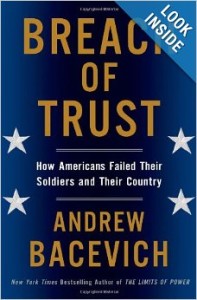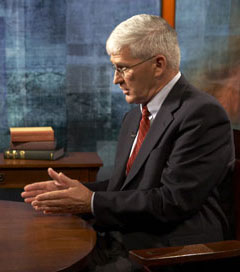 Pragmatic, Philosophical, and Patriotic, September 7, 2008
Pragmatic, Philosophical, and Patriotic, September 7, 2008
Andrew Bacevich
The book is a combination of pragmatism, philosophy, and patriotism, and a major contribution. To balance it out, I would recommend General Tony Zinni's The Battle for Peace: A Frontline Vision of America's Power and Purpose; Professor Joe Nye's The Paradox of American Power: Why the World's Only Superpower Can't Go It Alone; and General Smedley Butler's War is a Racket: The Antiwar Classic by America's Most Decorated Soldier. Also The Fifty-Year Wound: How America's Cold War Victory Has Shaped Our World. And of course Chomsky and Johnson.
My notes:
“The United States today finds itself threatened bhy three interlocking crises. The first of these crises is economic and cultural, the second, political, and the third military. All three share this characteristic: They are of our own making.” (p. 6)
+ US short on realism and humility. See my reviews of The Eagle's Shadow: Why America Fascinates and Infuriates the World and Why the Rest Hates the West: Understanding the Roots of Global Rage
+ Citizenship is down, debt is up.
+ Book is a call to arms for citizens to put our own house in order–lest we miss this point, the author places “Set thine house in order” on the first page (2 Kings, chapter 20 verse 1).
+ The author credits the left, in general, with advancing rights and liberties in the USA.
+ He points out how we have been drowning in red ink from 1975 (and in fairness to the right, I believe we can now recognize that Bill Clinton's “surplus” was based on Wall Street fraud and fantasy, postponing our reconciliation with reality and the truth).
+ The author is at pains to address the hypocrisy of our Nation, see also: The Cheating Culture: Why More Americans Are Doing Wrong to Get Ahead and Fog Facts: Searching for Truth in the Land of Spin.
+ The author explores how the demise of the Soviet Union created a great deal of instability, including in particular in Central Asia but also elsewhere.
+ He explicitly identifies President Ronald Reagan's “Tanker War” (the reflagging of Kuwaiti ships) as setting the stage for today, and points out that not only was Iraq rather than Iran behind most of the attacks, but this also created the American delusion that it could force the oil pipe to stay open.
+ He slams Clinton and Albright for various good reasons.
+ Great quotes:
– “Long accustomed to thinking of the United States as a superpower, Americans have yet to realize that they have forefeited command of their own destiny.” (p. 65)
– “Rather than confronting this reality head-on, American grand strategy since the era of Ronald Reagan, and especially through the era of George W. Bush, has been characterized by attempts to wish reality away. Policy makers have been engaged in a de facto Ponzi scheme intended to extend indefinitely the American line of credit.” (p. 66)
+ The author joins a wide range of others in condemning all Washington institutions: DYSFUNCTIONAL.
The author points out that the ideology of national security is the key CONTINUITY across BOTH the dysfunctional parties.
On page 85 he addresses the cult of secrecy and the manner in which virtually all of our governmental agencies (not just the spies and the White House) evade public accountability.
The author addresses how our politicians and our senior civil servants and flag officers (generals and admirals) have come to feel IMMUNIZED from public accountability.
I smile on page 91, when John F. Kennedy concludes on the basis of the Bay of Pigs that he was set up, and that CIA is not only incompetent, but the Joint Chiefs of Staff are either stupid or untrustworthy, or both.
He spends some time on the bureaucracy as the enemy of Presidents, and I would beg to differ. Our bureaucracy's are quite valuable, but only if we respect their deep and broad knowledge.
On page 113 I am fascinated to see Nitze's contribution described as a “model” in which the enemy is demonized, “options” are offered that manipulate the decision, a “code language” is used to sway the public, and panic is promoted to sweep away reasoned inquiry. Then he caps this by pointing out that Wolfowitz is the heir to Nitze.
The author begins drawing to a conclusion by pointing out that we have been distracted from the real lessons of the Iraq war, and this begins the very rich final portion of the book.
LESSON ONE: Ideology of national security poses an insurmountable obstacle to sound policy making
LESSON TWO: Americans can no longer afford to underwrite a government that does not work.
LESSON THREE: The Wise Men concept is moose manure. “To attend any longer to this elite would be madness. This is the third lesson that the Iraq War ought to drive homo. What today's Wise Men have on offer represents the inverse of wisdom. Indeed, to judge by the reckless misjudgments that have characterized U.S. policy since 9/11, presidents would be better served if they relied on the common sense of randomly chosen citizens rather than consulting sophisticated insiders.” p 122-123.
He offers three illusions that took rote post Viet-Nam:
1) That we reinvented war in its aftermath (naturally, emphasizing extremely expensive stuff that does not always work)
2) That we could achieve “full spectrum warfare” while ignoring counterinsurgency and small wars and gendarme and so on.
3) Civilian and military leaders and staffs learned to make nice and work together. NOT SO.
Three more lessons that he caveats:
1) Civilians screwed up Iraq BUT our generals were mediocre and subservient
2) Commanders need more leeway BUT in fact they did not lack for authority, they lacked for ability (and I would add, integrity)
3) Need to repair the gap between the military and the public by reinstituting the universal draft BUT draft is not a good idea because it perpetuates the large one size fits all military
FINAL LESSONS:
1) War is war and we cannot simplify it or second guess chaos and friction
2) Utility of the Armed Forces is finite
3) Preventive war is lunacy
4) We have lost the art of strategy
I strongly recommend this book for the War Colleges and for thinking adults who may be very concerned about who is giving advice to the two presidential candidates: “the Wise Men” and the young wanna-be “wise boys” who are trying so desperately to be adults but do not read much and have not spent much time in the real world.
See also:
Wastrels of Defense: How Congress Sabotages U.S. Security
Breach of Trust: How Washington Turns Outsiders Into Insiders








